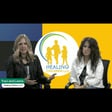Become a Creator today!Start creating today - Share your story with the world!
Start for free
00:00:00
00:00:01

Season Two/Episode Two: Empower Your Kids to Discover Their True Selves
The formative years of a child's life, from ages 0 to 8, are crucial for developing physical, cognitive, emotional, and social skills. But did you know that children also form their sense of identity during this time?
Mark Papadis, founder of the I AM 4 KIDS Foundation, explores the critical role of identity formation in a child's early years, how children develop their sense of self during these formative years, and the lasting impact it has on their lives.
Learn why a child's (and adult's) identity is so crucial and how you can support the young ones in your life as they navigate the journey of self-discovery.
Transcript
Podcast Introduction
00:00:06
Speaker
Welcome to the Guardians of Hope podcast where we bring together parents, nonprofits, legal and medical experts dedicated to positively impacting children's lives. I'm your host, Cynthia Ramserin. The purpose of this podcast is to inform and unite. Please seek advice from your attorney or doctor to address your specific needs.
00:00:29
Speaker
The thoughts and opinions of my guests are not necessarily my own, so thank you all for joining and sharing.
Importance of Early Development
00:00:37
Speaker
Welcome, everyone. Do you know the saying children are like sponges? Well, that is especially true during their formative years, ages zero to eight, when they develop their physical, cognitive, emotional and social skills. During this time, we as adults need to be aware of the environment that we provide and the tools we give them to feel empowered and confident.
Guest Introduction: Mark Papadis
00:01:01
Speaker
Researchers at the University of Washington's Institute for Learning and Brain Sciences
00:01:07
Speaker
found that children develop self-esteem by age five. And that self-esteem at age five is as strong as that measured in adults. Let's say that again, that self-esteem that they find at age five is just as strong as we adults. So here to discuss this and more is Mark Papadis who started I Am For Kids. Mark, thanks so much for joining me today. Oh, thanks for having me. It's ah it's a pleasure to be here.
00:01:36
Speaker
Absolutely.
Empowering 'I Am' Statements
00:01:38
Speaker
So why don't we start by telling us more about your backgrounds and your work for kids, work with kids, actually. Great. that Thank you so much. So so so my name is Mark Papadis and I'm known as the be great guy because of my work bringing personal development to kids.
00:01:55
Speaker
So if you have to describe me and that my work in one sentence, I like to say imagine Tony Robbins meets Charlie Brown. And it's mine and my team's mission to do for kids empowerment and personal development what the Muppets did for reading and for math. So we started started everything about 15 years ago, 2010, where we created a program that teaches kids how to develop their own empowering I am statement. In other words, their identity. And that's designed to sit on top of the curriculum taught in second through fifth grades. And we will literally give this program to any school that asks for it. Thanks for that. So why don't you tell me a little bit of um or let's discuss some of the common mistakes parents make that can hurt self-esteem.
Impact of Words on Self-Esteem
00:02:46
Speaker
Well, I think some of the, obviously, I don't think any parent purposely does things that are going to hurt their kids' self-esteem, or in some cases, their their grandkids' self-esteem. I think it's oftentimes, it's the little kind of off-the-cuff remarks or the things that you think that they don't get, that they do get, that you say. And it might not even be directly to them that wind up making that impact.
00:03:15
Speaker
you know I have a version of what you had said during the the intro. in terms of the the children are like wet glue. Is it anything that falls upon them tends to stick and leave an impression. And that's why it's so important that we we get to the kids at such a young age so that they can, that that glue can harden, right? So that when those things come, whether it's in those very formative years from zero to five, whether it's where we're where we start off at I Am For Kids in roughly eight to 12,
00:03:48
Speaker
but also works all the
Understanding Identity Formation
00:03:50
Speaker
way up to adults. It's just so much harder to break through all of that that hardened poor identity when someone's an adult though.
00:04:01
Speaker
what What is a poor, can you give me an example of poor identity? Or maybe we'll get into that later. But for the purpose of this, your answer here, maybe it'll be nice to have a little description of that. It's basically there's something that that doesn't empower somebody. It's something that brings not only negative energy to them, but negative consequences, right? It's the hear people say it all the times, like, you know, I'm a loser, but why does all this bad stuff always happen to me? That's always the the negative, negative, negative. And I'm not just talking about positive thinking, but when we really get into the science behind this, there's literally, this stuff works at a cellular level, at both in in the brain of the neuroplasticity, but also through the whole mind-body connection as well.
00:04:47
Speaker
Okay, excellent. Thanks for that. So let's throw social media into the mix. um And unreal expectations that come along with it. How is this harmful or helpful to your cause?
Social Media's Role in Identity
00:05:04
Speaker
Well, I guess it like any tool, it can be both. I would say it's harmful to the cause for people who don't really know anything about how to have that that identity within themselves. So they especially with with children, is if they haven't decided for themselves is generally the loudest voices in their orbit is what's going to determine how they finish their statement, I am, dot, dot, dot. So if all of the the people around them are, quote unquote, perfect writing and all those those unrealistic expectations that you're talking about and in their mind, they don't measure up. OK, now they're they're less than right now, they're they might even go as far as to say that they're a failure or a loser.
00:05:50
Speaker
It can can be a tool to be used for the positive in terms of, from like from my standpoint, is to get the information out there so that it's available to people. So that would be a positive part of it. And then if we can actually get the kids to start working together, the ones who are working on their identities. And that's part of what but we call the I Am For Kids roundtable is all about. It's basically a a mastermind for kids and their families.
00:06:17
Speaker
to be able to work together and take you know the old rising tide lifting all of those boats. So does that did that answer your question or did I kind of dance around it? No, I think it does. And maybe when you talk a little bit more about your program and who has access to it, we can elaborate a little bit
I Am For Kids Program Overview
00:06:37
Speaker
more. So why don't we start there?
00:06:39
Speaker
Okay, so in terms of the program, it's been in existence for, I think we released it in, I wanna say 2013, 2014. And it's available, like I said, to all schools. You can just go to to our website. It's iam, the number four, kids dot.com. And there is a form right there where your school just has to fill it out and we will send you the the program.
00:07:05
Speaker
Basically what it is is it's me interacting with five animated characters who are all based on real kids. And I take those characters through the identity building process that I created. And we know certain characters answer the questions when I'm taking them through the process the way that we know certain percentages of the kids in the classroom are feeling.
00:07:26
Speaker
So now those kids in the classroom don't feel that they're weird or strange for thinking a certain way that they might not have voiced or even written down or admitted to themselves up until that point. And so basically, it's so that so that's what that's all about. i said It's designed to sit on top of second through fifth grade curriculum. And we've had some amazing results in the the pilot classrooms and the other ones, you know and since the pilots, where Over 40% of in class grade so we're not necessarily talking about test scores because for privacy reasons they can't share that with us, but see students moving up to be students.
Program Success Stories
00:08:02
Speaker
And then the one that I wouldn't say surprised us that it happened but surprised us to the extent.
00:08:09
Speaker
was that over 60% of disciplinary actions, disciplinary actions decreased, is what I should say, by over 60% in the classes that that was in. Because all they had to do was be reminded of are they being true to to themselves. And it was amazing how they just would kind of turn back into that state of of being not out of line.
00:08:32
Speaker
understood So you're attributing positive self-esteem with lower incidences in negative behaviors and higher instances in academic achievement. Is that right? Yes. and you know I'm a big believer in the old words have meaning.
00:08:53
Speaker
and so but There are certain terms that that meant something or mean something in a clinical setting that then wind up being somewhat hijacked or yeah maybe bastardized a little bit when it comes to you know but you know popular nomenclature. And what self-esteem has become is a little bit more of just positive thinking.
00:09:17
Speaker
that that little Little Johnny is awesome, right? That that but identity is is more than that. Because when you know one of any psychologist will tell you is that the the hardest thing to do for a human being is to, for any period of time, act in a way that is not congruent with your core beliefs.
00:09:41
Speaker
So if you don't if you haven't decided what those core beliefs are, if you don't have any, you really have no so anchor there, right? Nothing to to hold on to in terms of being your guide. And that's what but we're talking more about is is the identity piece, which ah to me is is more than just self-esteem. Absolutely. It's much more bigger than that. And why don't you talk about why um a kid's identity and even an adult's identity is so important?
Identity vs. Self-Esteem
00:10:11
Speaker
Well, so a little background to answer that question. so So I had an epiphany at the end of 2009 to stop what I was doing with adults. I had been working for over a decade as a sales trainer and a personal development coach with so-called grownups, right? And the one of the things that I would teach, especially to the salespeople, and it's something that I had learned from Zig Ziglar many, many years ago, is that a salesperson could never out-earn his or her belief system. So in other words, if somebody was only making 20, 30, $40,000 a year, it's because in their mind, that's what they were worth. So that's where we always had to start with with the salesperson first before you could start to to train them. i won't It's a great story, but I don't know if we have time for it. If we if you decide we do at the end, I'll tell you the story of the the Night of the Epiphany because it gives me goosebumps every time I tell it.
00:11:04
Speaker
So it's the same five-step process that I did with adults that I do with kids. It's just obviously taught in a completely different way. So the the the first thing that they do in a in the setting is they're given a blank sheet of paper that just has the words, I am, on the top of it. They say, go ahead and just finish that thought. And again, it doesn't matter whether it's kids or adults. Hands go up, right? It's like, what do how do you want me to answer this? What are you looking for? It's like, hey, there's no right or wrong answer. Just answer it however you think you should.
00:11:32
Speaker
So over 80% of the time with the adults, they answered either with their name and or their occupation. Either of which has anything to do with who who you are, the standards you hold yourself, your core beliefs on, any of that kind of stuff. It's a label you were given by your parents when you were born and however you're, whatever you're doing now to put food on the table.
00:11:54
Speaker
The scary part was when in our pilot classrooms, when given that to the kids. So one thing we weren't surprised by is almost every kid answered with a one word answer. Cause that's how kids answer questions, right? You know, how was school today? Good. you know that's The scary part was that over 50% of the time that one word answer was a negative trader characteristic with the three most common being, I'm fat, I'm stupid, or I'm ugly.
00:12:20
Speaker
And that's when we realized that mean we we knew that there was identity problem, but we didn't realize to what extent. And so that's why you literally since that night of that epiphany that I that i had i literally shut down my adult business that night, I fulfilled the contracts that I had something like that, but I dedicated the rest of my life to doing this.
00:12:40
Speaker
You can talk about the Epiphany, I'm i'm dying to know actually now. so i said it It's the closest thing to like an out of body experience that I can
Mark's Epiphany on Children's Development
00:12:52
Speaker
i can think of. so the at the time so i
00:12:57
Speaker
Because of my busy work schedule, I could never be the head coach in any of my kids' youth sports teams. But I was always help i was always there to be a helper, to be an assistant coach. So my son was playing youth football this particular year. And the season was over and a number of the coaches had gotten together at a local establishment, just to have a couple of beers, a little camaraderie.
00:13:16
Speaker
And one of my son's coaches comes over and he started, you know, basically going on a positive rant about my son. like any Anytime I get a chance to get Little Pappy because we didn't have first names, I was Big Pappy. My son was Little Pappy. Anytime I get a chance to get him on my team, I'm going to take him. He's really coachable. He listens. He's a natural leader. The other kids follow him. He's just once again going on and on. Great things about my son. And then I did something that we all do, but nobody ever admits to where I mentally checked out of the conversation.
00:13:46
Speaker
And I started thinking, wouldn't it be great if every parent could have these types of conversations about their kids? It's like, what could I do about that? And then I realized he was still talking. so i kind of you know And I reengaged in the conversation. But see here they come. They're starting already. the I know that that was the spark for what happened later that evening. I went home. I got in bed. And then that stage of sleep before you hit REM, when literally just
00:14:12
Speaker
It just came to me but like like a lightning bolt. I was completely energized. Like, hey, dummy you you know all this stuff. You've been teaching this for years. All you have to do is put it into a format that will engage and entertain the kids.
00:14:24
Speaker
And then it literally just started to download how it's all going to work. So unlike those nights when we've had great ideas and we're going to write them down in the morning and we wake up in the morning and it's like, Oh, it was that it was so good, but you have no clue. I got up, I went downstairs. I just started writing it all down and I'm divorced now, but my then wife had come downstairs and she's kind of like, what are you doing? I'm like, it's not done yet. And about 80% of what I am for kids is today came from that download that night.
00:14:56
Speaker
Amazing. Thanks for sharing that story. So yeah I have one more question for you. What are some of some other secrets that you have for empowering and increasing self-esteem and identity ah knowledge in kids?
Secrets to Empowering Kids
00:15:11
Speaker
So there's i mean part of that, a lot of that's covered in my book, it's called 10 Secrets to Empower Kids and Awaken the Child in You. It's available on Amazon. ah You can just look it up by my name or just type in 10 secrets. the The number one and part of why I'm known as the be great guy, the the number one secret is something that i said I've used with my kids and now my oldest daughter is using it with her three kids as well.
00:15:35
Speaker
is that any time I leave an interaction with whether it be you know so one of my kids, whether it be a client family, et cetera, it's always be great. And what that does is there a it's it's A, it's a subconscious command to them to be great. But the other part of it is their response with enthusiasm is I am.
00:15:59
Speaker
And over a period of time, if you do that for consistently for two or three weeks, you will notice the difference in in the kid just in terms of how they carry themselves, because literally you're working on that those neuroplastic connections that get made between the brain and the body. And it's amazing to see some of the the transformations just literally from people who've told me that that's the only secret that they've employed, and they can notice a difference. The other ones, I think the most important ones is is to talk with your kids and not to your kids. And if you involve them in the conversations, if you let them have input, if it's not just a lecture of what you're doing wrong and you shouldn't be that way, et cetera, you'll be, ah again, you'll be amazed of the buy-in that you'll get.
00:16:46
Speaker
the one thing that I've had some parents that have been hesitant to try. But then once they did, they were like, wow, this really worked. is Especially when it when it comes time to where a child does need to be disciplined in some way, shape, or form. I don't want to say so much punished, but you know something that they that they know they did wrong. but So there has to be some sort of a negative consequence for that. I will always ask, so what do you think asking the kid, what do you think would be an appropriate punishment for this? And usually, they'll come up with something way harsher than what what I think or what the parent thinks.
00:17:25
Speaker
right, because they know that they know that in their mind, okay, this is pretty bad and it' for grown for a month. I was like, no yeah you know, I think no Xbox for a week or something like that should is sufficient for this. You didn't kill anybody, you know, kind of thing, right? So I would say those would probably be two other ones that would be ones that people could start using right away without even having to go buy the book, but I would recommend that you do and appreciate it.
00:17:46
Speaker
Yeah. Well, why don't you tell us ah where to get more information about your organization and also the name of your book as well. I'll also link it in the description. But if you share that again, um that'll be great. Thanks.
Finding Resources and Closing
00:18:01
Speaker
Thank you. So yeah, so for the, as far as the organization, it's I it's www dot I am the number four kids.com. So I am for kids.com. And if you want to find out about my book, you can just type in, uh, but a www 10 secrets book dot.com. You can either spell out 10 or use number 10. We have both. ah So 10 secrets book.com will take you right to the Amazon page where you can order the.
00:18:27
Speaker
the book. It is also available in Spanish. ah You'd have to actually look that one up separately on on Amazon though. Okay, perfect. Mark, thank you so much for sharing your knowledge with us about identity and how important it is for our kids. And I appreciate your time. Thanks. It was my pleasure. And always remember, be great.



















